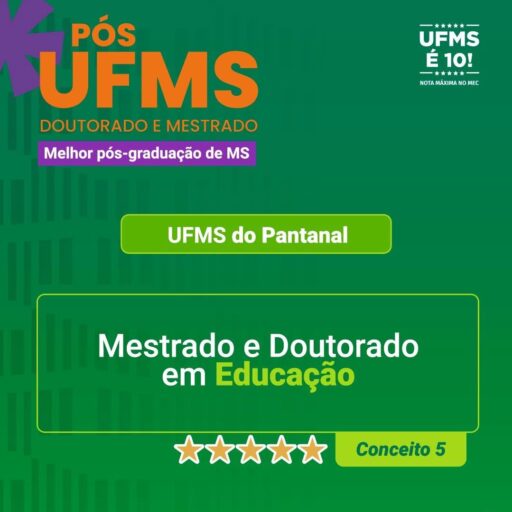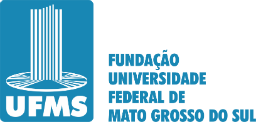NATIELY RAMYLA DE ALMEIDA FERREIRA NOBRE – DAS ÁGUAS DO RIO AO SOM DAS AVES PANTANEIRAS: a formação para o trabalho em escolas ribeirinhas do pantanal sul-mato-grossense na visão de professoras alfabetizadoras
RESUMO
A presente dissertação faz parte da linha de pesquisa “Práticas educativas, formação de professores (as)/educadores (as) em espaços escolares e não escolares” do Programa de Pós-Graduação em Educação (PPGE) da Universidade Federal de Mato Grosso do Sul (UFMS) – Câmpus do Pantanal (CPAN), área de concentração em Educação Social. Parte do pressuposto de que a escola do campo, no contexto ribeirinho, possui singularidades que diferem das escolas da cidade, sendo necessário um trabalho de alfabetização, pautado nas especificidades da população ribeirinha, em seu aspecto social, econômico e político. No contato com estudos que abordam as escolas no campo, verifica-se uma ênfase no currículo das escolas da cidade, distanciando-se da realidade dos (as) educandos (as), tornando-se um desafio aos (às) professores (as) que atuam nessas regiões. Ao focalizar o (a) professor (a) alfabetizador (a) nesse contexto, algumas questões emergem tais como: será que receberam formação inicial e/ou continuada para atuarem nesses contextos? Quais motivos os (as) levaram a atuar em escolas ribeirinhas? Em busca de respostas, a pesquisa teve como objetivo geral compreender a percepção de professoras alfabetizadoras dos Anos Iniciais do Ensino Fundamental sobre a sua formação para o trabalho em escolas ribeirinhas da rede municipal de ensino de Corumbá, MS. Como objetivos específicos buscaram-se: (i) identificar como as professoras avaliam a formação inicial do Curso de Pedagogia para atuar em escolas ribeirinhas; (ii) conhecer como as professoras refletem as práticas de alfabetização, em contexto de escola ribeirinha e a relação com os saberes socioculturais da região do Pantanal. Numa abordagem qualitativa, o estudo é descritivo e exploratório, segundo os objetivos, tendo como procedimento para produção de dados a realização de entrevista, com roteiro semiestruturado, com cinco professoras alfabetizadoras, com atuação de um ou mais anos, em escolas, localizadas às margens do Rio Paraguai. Os dados foram organizados em três eixos: (i) formação, (ii) ser professora ribeirinha; (iii) prática pedagógica, buscando analisar no depoimento delas o que foi recorrente e quais as singularidades. Com relação à formação, os resultados indicam que a formação inicial precisa ser diferente, devido às especificidades do contexto e que na formação continuada, embora haja avanços, são apontadas, como retrocesso, ações descontextualizadas das escolas ribeirinhas. Quanto ao ser professora ribeirinha, a análise indica que, embora seja positivo o aprendizado com as crianças e o conhecimento da cultura local, as professoras relatam dificuldades relativas ao distanciamento da cidade e dos familiares, ao trabalho com crianças deficientes, em salas multisseriadas, bem como à logística na espera de materiais necessários para realizarem as aulas. Com relação à prática pedagógica, as alfabetizadoras evidenciam que partem do contexto sociocultural das crianças, tomando como fontes ações de formação continuada, livros, pesquisas na internet e/ou busca de orientações com a coordenação da escola. Se esse rio fosse nosso, um currículo específico seria elaborado para as escolas ribeirinhas, os (as) professores (as) teriam melhores condições de trabalho, seriam mestres e/ou doutores (as), pois o compromisso é por uma escola da comunidade ribeirinha e não na comunidade ribeirinha.
ABSTRACT
The present master thesis is part of the research line “Educational practices, teacher/educator training in school and non-schooling environments” of the Postgraduate Program in Education (PPGE) at the Federal University of Mato Grosso do Sul (UFMS) – Campus Pantanal (CPAN), with concentration area in “Social Education”. This work assumes that the rural school, in the riverside context, has singularities that differ from city schools, requiring a literacy work based on the specificities of the riverside population, in its social, economic, and political aspects. In contact with studies that address schools in the countryside, there is an emphasis on the curriculum of the city’s schools, distancing itself from the student’s realities, making it a challenge to teachers who operate at riverside regions. When focusing on the literacy teacher in this context, some questions emerge such as: did they receive initial and/or continued training to work in these contexts? What reasons led them to work at riverside schools? Seeking responses to these relevant questions, this research had as general objective to understand the perception of literacy teachers from the beginning years of Elementary School about their formation to work at riverside schools in the municipal education network of Corumbá city, MS. As specific objectives, we sought to: (i) identify how teachers assess the beginning training in the Pedagogy graduate to work at riverside schools; (ii) know how teachers reflect literacy practices in the context of a riverside school and the relationship with sociocultural knowledge in the Pantanal region. In a qualitative approach, the study is descriptive and exploratory according to the objectives, having as a procedure for data production an interview, with a semi-structured script, with five literacy teachers working for one or more years in schools located on the banks of the Paraguay River. The data were organized into three axes: (i) teacher training, (ii) being a riverside teacher; (iii) pedagogical practice, seeking to analyze in their testimony what was recurrent and the singularities. Regarding training, the results indicate that the initial training needs to be different due to the specifics of the context and in continuing education, although there are advances, decontextualized actions of riverside schools are pointed out as a setback. As for being a riverside teacher, the analysis indicates that, although learning with children and knowledge of the local culture is positive, the teachers report difficulties related to distancing themselves from the city and their families, working with disabled children, in multigrade classrooms, as well, such as the logistics in waiting for the materials needed to carry out the classes. Regarding the pedagogical practice, the literacy teachers show that they start from the sociocultural context of the children, taking as sources continuing education actions, books, internet research and/or seeking guidance with the school’s coordination. Therefore, we conclude that, if the river were ours, a specific curriculum would be designed for riverside schools, and the teachers would have better working conditions, they would be masters and/or doctors, because the commitment is to demand for a school owned by the riverside community and not just localized at the riverside community.


